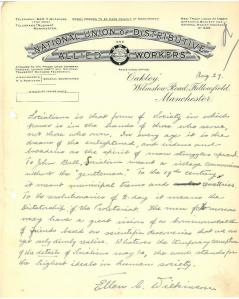Book review: Socialism with a northern accent: radical traditions for modern times by Paul Salveson. Lawrence & Wishart, 2012 ISBN 978-1-907103-39-1
In 1998 at the Brit Awards the anarcho-punk band Chumbawamba attempted to throw a bucket of water over John Prescott and Cherie Blair/Booth. They said at the time: “If John Prescott has the nerve to turn up at events like the BRIT Awards in a vain attempt to make Labour seem cool and trendy, then he deserves all we can throw at him”. John Prescott (and Cherie B/B) epitomise the worst in terms of working class people who have gained money and power and then peddle a stereotyped view of what it means to be working class.
In his introduction Prescott, or rather Lord Prescott, plays on his long forgotten (and ditched) working class background to extol the virtues of the last Labour government, whilst forgetting to mention that many of the policies that the Con/Dem coalition are following were originally New Labour policies. He may hope that he can use the past to rescue the Labour Party at the next election, but the voters will not be so easily conned.
Paul Salveson, Labour party councillor and Member of the British Empire, is quite clear about his agenda for this book. “Socialists – be they Labour Party members, Greens or non-aligned radicals – should have an awareness of their heritage that can help inspire campaigning today”. He says the book “draws on examples of radical politics and culture in the North over the last two hundred years that are, to a greater or lesser degree, distinctive to the region, and have lessons for us today.”
Salveson concentrates on the north because, he argues, “Labour needs to cultivate a patchwork of regional and national identities, both political and cultural, as part of a wider “Britishness” celebrating a diverse, confident and progressive Britain of regions and nations.” For northern he means North West, Yorkshire and the Humber and the North East. And that word “socialism” again, only this time with a “northern accent”.
He traces the struggle for democracy within movements such as Peterloo and Chartism and places it within the distinctive history of the north. He introduces characters such as Thomas Newbiggin, a radical Liberal and shows how in the 1880s there was a radical Liberal political culture. It’s hard to believe this when the present day Lib Dems find it easy to get into power with the Conservatives.
Salveson explores the growth of the trade unions and alongside it progressive organisations such as the Social Democratic Federation, the Independent Labour Party (ILP) and the Labour Party.
A large chunk of the book extols, quite rightly, the important role that the ILP played in improving the lives of working class people. It was founded in 1893 in Bradford and “the achievements of scores of ILP councillors at the municipal level were considerable – free school milk, improved sanitation, municipal lighting, council run tramways,”fair wages’ clauses in council contracts and council housing”.
The ILP was not just a political party, it was a way of life with socialist education, journalism, music and art. However, by 1932 the Labour Party had changed from a community, grassroots organisation to an electoral machine and the ILP severed all links with the party.
It’s the template of the ILP that Salveson sees as the future for the Labour Party. “Can Labour recapture some of the radicalism and passion which informed the early years of the ILP and the Clarion Movement?”. This book is essentially about how they, the Labour Party, can re-fashion themselves for the next general election. However, he fails to address the reason why they lost 5 million voters between 1997 and 2010. One has only to look at the early days of the New Labour Government and their harsh treatment of single parents on benefits, the use of ASBOs against largely poor working class young people, the privatisation of elderly social care…I could go on. It was not just that they looked down upon their own voters but that in power they flaunted their wealth and power with their celebrity mates.
This is very much a nostalgia fest as Salveson returns to Bradford and the ILP birthplace as a good model of a Labour council. Clearly, he did not really know what was going on there as shortly after he published this book George Galloway and the Respect Party swept the Labour Party aside to grab power at a national and local level.
It is interesting that Salveson MBE and Lord Prescott still consider themselves to be socialists and believe that there are socialists still in the Labour Party. But it is clear that the people that he lauds in the book would be horrified if they saw what the Labour Party had done in their 13 years of government and would quite rightly line themselves up with everyone outside of the Labour Party.
One of the reasons that Labour faces an uphill struggle to regain its working class roots is that people are so disengaged with the political process and in particular young voters. Many young people are active in social movements such as UK Uncut and Occupy where there is no hierachy of old men to tell them what to do. They have created their own communities, some of which have similarities to the radical culture of the ILP, but they see power in a completely different way from electoral politics. They are the ones, not the Labour Party, who to quote the subtitle of this book have “radical traditions for modern times”.
Bernadette Hyland, Library volunteer

